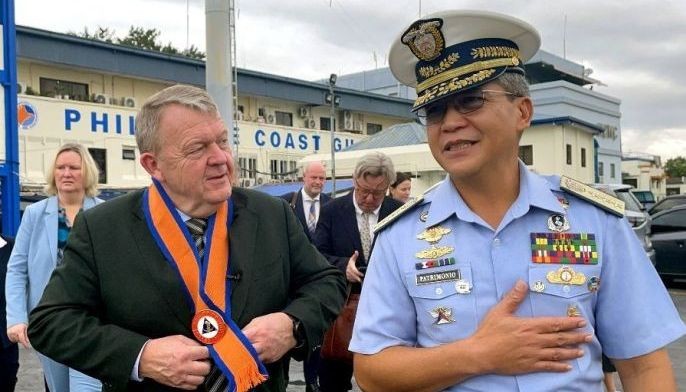MANILA, Philippines (Updated 5:35 p.m.) — Denmark's foreign minister sought firsthand accounts of Chinese Coast Guard incidents within the Philippines' exclusive economic zone on Monday, December 9, as his country prepares to join the powerful United Nations Security Council.
Danish Foreign Affairs Minister Lars Løkke Rasmussen's visit to the Philippine Coast Guard (PCG) headquarters in Manila was one of his first stops in the country, according to the PCG official who spoke to him. It is also the first official visit by Denmark's foreign affairs minister to the Philippines in 25 years.
Rasmussen was briefed about the current maritime tensions gripping the South China Sea, where Chinese Coast Guard vessels and — more recently, warships — have used water cannons and conducted dangerous maneuvers against Philippine fisheries and Coast Guard vessels.
Rasmussen said he specifically met with PCG officials to hear "firsthand the challenges linked to the Philippines upholding its own territory, the incidents with the Chinese Coast Guard and what we can do about all this."
"Basically [we discussed] two things. One is about the capacity, what is the capacity of the Coast Guard, what can be done to improve that. Of course it's a total disbalance towards China," Rasmussen told reporters.
"More importantly, since Denmark is now joining also the UN Security Council, it's the international law and what we've done in the international forum to force all countries including China to uphold the regulations in the conventions," Rasmussen added.
The Danish minister's visit comes around a week after Chinese vessels blocked and used water cannons against Philippine fisheries and Coast Guard vessels near two disputed features in the West Philippine Sea, the part of the South China Sea that overlaps with the Philippines' 200 nautical mile EEZ.
Chinese conducted "aggressive" maneuvers against Philippine vessels near Scarborough and Escoda Shoal, where Coast Guard officials said People's Liberation Army vessels were spotted blocking Philippine fisheries vessels for the first time. Beijing, meanwhile, said it was taking action against Philippine vessels that "attempted to intrude" into its waters.
The Danish minister said his visit to the PCG was significant as Denmark was a "small country" but a "big maritime nation" that has a stake in upholding freedom of navigation in the region.
"The freedom to navigate is crucial for us, it's crucial for world trade, and it's crucial for everybody," Rasmussen said.
An international tribunal in 2016 ruled that China's claims cannot extend beyond the limits imposed by the United Nations Convention on the Law of the Sea, which Beijing ratified in 1996. China has never recognized this ruling.
Rear Admiral Robert Patrimonio — commander of the PCG's maritime security law enforcement command — led the discussions with the Danish minister. While the Danish foreign minister was "briefed" about the West Philippine Sea, the PCG declined to provide specifics beyond saying they "briefly touched on the deployment."
The PCG, however, received assurances from Rasmussen that Denmark is planning to expand its cooperation with the Philippines, specifically on capacity building programs with the PCG.
"This is where we see an opportunity for the modernization program of the Philippine Coast Guard, which is not only for ships and airplanes, but also for the capacity of our personnel," PCG spokesperson, Commodore Algier Ricafrente, told reporters. He was also present during discussions with the Danish minister.
The proposed cooperation between Denmark and the Philippines focuses on training programs, particularly on maritime laws and leadership. "So that we can have a commonality of interpretation," Ricafrente said.
"We haven't discussed hardware, but we're focusing on low-hanging fruit first. But it will come in handy depending on our discussions with our national government," he added.
Coast guard cooperation
Rasmussen also met with Philippine Foreign Affairs Secretary Enrique Manalo after his Coast Guard visit.
In a joint press conference, Manalo said both countries agreed to deepen cooperation in various areas including trade, defense, green energy transition, maritime affairs, and green shipping.
While Manalo mentioned possible coast guard-to-coast guard engagement as part of their discussions, Rasmussen noted such cooperation was still "premature to conclude on."
Rasmussen outlined other potential areas for maritime collaboration: "I also raised the hope that we could collaborate more on – in the maritime area, in terms of maritime security, in promoting international law, maritime law, cooperation on the economy, on the marine environment, biodiversity, as well as other issues such as marine disaster prevention," he said.
"We also considered the possibility of defense cooperation in the future, and I think that's where we could also appreciate increasing our ties," Rasmussen added.
Danish Ambassador to the Philippines Franz-Michael Mellbin was one of several ambassadors who called out China over its actions against Philippine vessels last week, saying that China's actions "undermine" both UNCLOS and maritime safety.
RELATED: Countries condemn China's 'unlawful' actions vs Philippine vessels
In June, Denmark was elected for a non-permanent seat on the UN Security Council for the period of 2025 to 2026.
The UN Security Council is the main UN body that deals with international peace and security. China is one of five countries with a permanent seat on the council, along with the United States, Russia, United Kingdom and France.
The Philippines is currently campaigning for a non-permanent seat in the UN Security Council for the term 2027 to 2028.
--
Erratum: An earlier version of this article misattributes a quote to Real Admiral Patrimonio. It has been corrected to PCG spokesperson Ricafrente.


